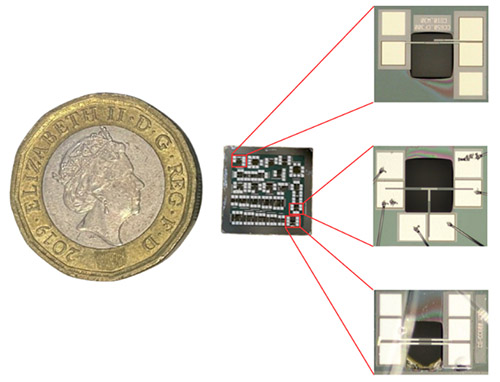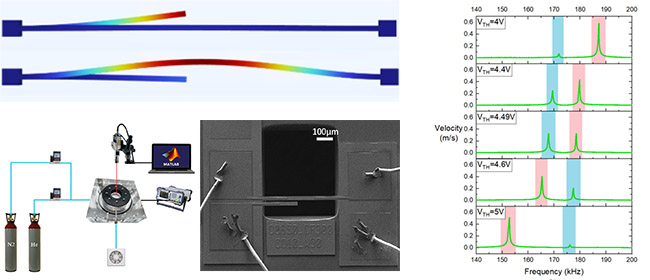MicromachinEd Mechanics for Sensing Applications (MEMS-A)

With the accelerated need for sensors in a wide range of classical and novel applications, Micro-electrotechnical systems (MEMS) based sensors can be of great service thanks to their small size, accuracy, reliability, low power consumption, quick response, and ultra-sensitivity, providing invaluable monitoring for targeted applications.
Our research aims
The MicromachinEd Mechanics for Sensing Applications (MEMS-A) lab conducts fundamental and applied research in the area of MEMS dynamics. Research involves designing, modelling, and testing various MEMS devices, operating in linear and nonlinear regimes, for sensing applications, focusing on multi-functional sensors using a single structure.

Our fundamental research aims to investigate basic concepts related to the linear and nonlinear dynamics of MEMS structures including, frequency tunability, veering, internal resonance, and frequency sub-combinations.
Our applied research aims to solve industry-related problems, such as industrial processes, air quality and monitoring of nuclear spent fuel canisters. The activities include mainly novel MEMS sensors with multi-functional capabilities.

Research outcomes
Our research has led to the development of versatile multi-function sensors able to detect two stimuli simultaneously based on anti-symmetric weakly coupled MEMS resonators. The numerical results highlight the potential of such structures for simultaneous detection using their nonlinear dynamics features.
As a proof of concept, an experimental investigation was conducted on AlN-piezoelectric MEMS sensors fabricated using a commercial multi-user fabrication process (PiezoMUMPs) based on 150μm n-type polished silicon on insulator (SOI) wafers. The experiments have demonstrated high sensitivity to Helium and great capabilities for multi-gas sensing.
Our research has been funded by the Transforming Foundation Industry (TFI) Network+ (supported by WEIR and MPIUK) and the Nuclear Decommissioning Authority (NDA, via PhD research in collaboration with the National Nuclear Laboratory NNL).
Research dissemination
Our research has been promoted and disseminated at International Conferences, such as ENOC, NODYCON, ASME IDETC, IEEE Sensors, PowerMEMS and via social media channels.
Our research in micro- and nano-technology, is focused on developing accurate and low-power micromachined multi-functional sensors for a wide range of applications including environmental monitoring, automotive transportation and nuclear decommissioning.
Research members
Selected publications
- Fang, Z., Theodossiades, S. and Hajjaj, A.Z., 2023, Triple sensing scheme based on nonlinear coupled micromachined resonators. Nonlinear Dynamics. https://doi.org/10.1007/s11071-023-08674-6
- Fang, Z., Theodossiades, S., Ruzziconi, L. and Hajjaj, A.Z., 2023. A multi-sensing scheme based on nonlinear coupled micromachined resonators. Nonlinear Dynamics. https://doi.org/10.1007/s11071-023-08294-0
- Ruzziconi, L. and Hajjaj, A.Z., 2023. Multiple internal resonance couplings and quasi-periodicity patterns in hybrid-shaped micromachined resonators. Chaos, Solitons & Fractals. https://doi.org/10.1016/j.chaos.2023.114145
- Hajjaj, A.Z., Ruzziconi, L., Alfosail, F. and Theodossiades, S., 2022. Combined internal resonances at crossover of slacked micromachined resonators. Nonlinear Dynamics. https://doi.org/10.1007/s11071-022-07764-1
- Fang, Z., Theodossiades, S., Jaber, N., & Hajjaj, A. Z. (2023, October). Gas Sensor Based on Nonlinear Coupled AlN-Piezoelectric Micromachined Resonators. In 2023 IEEE SENSORS (pp. 1-4). IEEE.
- Fang, Z., Theodossiades, S., Dejene, F., & Hajjaj, A. Z. (2023, December). Dynamics of a piezoelectric MEMS gas sensor based on coupled micromachined resonators. In 2023 IEEE 22nd International Conference on Micro and Nanotechnology for Power Generation and Energy Conversion Applications (PowerMEMS) (pp. 19-22). IEEE.